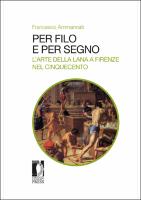Per filo e per segno
L’arte della lana a Firenze nel Cinquecento
| dc.contributor.author | Ammannati, Francesco | |
| dc.date.accessioned | 2022-05-31T10:34:05Z | |
| dc.date.available | 2022-05-31T10:34:05Z | |
| dc.date.issued | 2020 | |
| dc.identifier | ONIX_20220531_9788864539836_861 | |
| dc.identifier | OCN: 1181937662 | |
| dc.identifier.issn | 2704-5919 | |
| dc.identifier.uri | https://library.oapen.org/handle/20.500.12657/55577 | |
| dc.language | Italian | |
| dc.relation.ispartofseries | Studi e saggi | |
| dc.subject.other | textile manufacture | |
| dc.subject.other | wool | |
| dc.subject.other | 16th century | |
| dc.subject.other | economic history | |
| dc.subject.other | Florence | |
| dc.title | Per filo e per segno | |
| dc.title.alternative | L’arte della lana a Firenze nel Cinquecento | |
| dc.type | book | |
| oapen.abstract.otherlanguage | The wool manufacture, along with the International trade and finance, was one of Florence’s leading sectors in the Late Middle Ages. The sixteenth century has been only touched by the historical-economical studies, perhaps because it was traditionally considered a period of decadence. More recent research has instead highlighted the need to rethink these conclusions, demonstrating how the textile sector represents a good point of observation for deepening the critical points and evaluating the prospects of the economy of the city of the Lily in the 16th century. Alongside the analysis of a case study and the critical re-elaborations of what literature offers on more general topics, the book presents a long-term view of the process of the rise and decline of the Arte della Lana in Florence, reinterpreting it in the light of new archival investigations. | |
| oapen.identifier.doi | 10.36253/978-88-6453-983-6 | |
| oapen.relation.isPublishedBy | bf65d21a-78e5-4ba2-983a-dbfa90962870 | |
| oapen.relation.isbn | 9788864539836 | |
| oapen.relation.isbn | 9788855186834 | |
| oapen.relation.isbn | 9788864539829 | |
| oapen.series.number | 207 | |
| oapen.pages | 410 | |
| oapen.place.publication | Florence |

